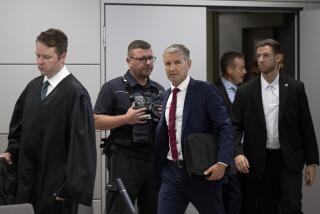Russia Says Honecker Will Be Expelled
- Share via
MOSCOW — The Russian Federation has decided to expel former East German leader Erich Honecker, its justice minister said Saturday, but Soviet President Mikhail S. Gorbachev opposes returning him to stand trial in Germany on charges of giving shoot-to-kill orders to guards at the Berlin Wall.
Russian Justice Minister Nikolai Fyodorov told the independent Moscow news agency Interfax that Honecker’s presence violates international law and the republic’s criminal code and that the Russian government had decided Friday to expel him. The decision will be put into writing this week.
“The timetable for carrying out this decision is not known yet,” Fyodorov told Interfax. He added that Russian Federation President Boris N. Yeltsin, who is traveling Thursday to Germany, would discuss the problem with Chancellor Helmut Kohl.
Honecker, 79, East Germany’s leader for almost two decades, was forced to resign by popular protests in October, 1989. Last March, he was spirited out of a Soviet military hospital in eastern Germany to Moscow by the Soviet military, provoking angry protests from the Kohl government.
Bonn is now seeking his return on manslaughter charges. Nearly 200 people were killed trying to escape East Germany, either at the Berlin Wall or elsewhere along the border with West Germany.
Honecker is accused of giving the border guards shoot-to-kill orders to deter escapes, and the question of his legal, political and moral responsibility is a major issue in Germany.
Yeltsin told the German newspaper Die Zeit last week that Gorbachev was blocking efforts to send Honecker back to Germany. The Soviet president feels a “moral obligation” to the former East German leader, according to Pavel Voshchanov, Yeltsin’s press secretary.
Gorbachev “says he has a moral difficulty in sending Honecker back,” Voshchanov said Saturday. “It’s not just because they are both former Communists, or the close relations that the Soviet Union had with East Germany. It’s that they also were fairly close friends.”
Voshchanov said that he did not know of any offers from other Soviet republics to accept Honecker if Gorbachev does give him political asylum.
In Bonn, German Justice Minister Klaus Kinkel welcomed Fyodorov’s announcement but said he had no official word from Moscow.
“If the Russian Cabinet has decided to expel Honecker, then that is a first important step, but one that must be followed soon by deeds,” Kinkel told the newspaper Bild am Sonntag.
Kinkel said he hopes that a firm date for Honecker’s deportation will be set in talks Monday in Bonn with Fyodorov and a representative of the Soviet Justice Ministry.
Kinkel added that the decision would help create a favorable atmosphere for Yeltsin’s visit, which is aimed at developing direct contacts between the Russian Federation and Germany.
Honecker learned of the decision Saturday while watching Soviet television, according to the Dresden newspaper Morgenpost am Sonntag, and he reportedly decided to ask Gorbachev formally for political asylum.
The Morgenpost quoted his “close friends” in Berlin who had spoken with Honecker’s wife, Margot, by telephone. The paper said the friends believe that Honecker “would rather commit suicide than be forcibly extradited.”
Honecker has said he would return to Germany only if the charges against him are dropped, but German prosecutors have said they are determined to proceed.
In Berlin, one of Honecker’s lawyers, Nicolas Becker, said the Russian decision does not mean that he will be returned soon.
“Whether expulsion from Russia means deportation to Germany is a big question, especially since Yeltsin has said he needs to clear up the matter with Gorbachev, who does not agree (to deportation),” Becker told the Reuters news agency.
BACKGROUND
East German border guards shot to death nearly 200 would-be defectors to the West between 1961--when the Berlin Wall was built--and 1989. Shrapnel-firing booby traps and land mines injured at least 700 people trying to flee in the Cold War era. East Germany concealed the SM-70 shrapnel-firing devices and mines along the steel-mesh border fence with West Germany to deter defections. The SM-70s and mines were removed in the early 1980s.
More to Read
Sign up for Essential California
The most important California stories and recommendations in your inbox every morning.
You may occasionally receive promotional content from the Los Angeles Times.













